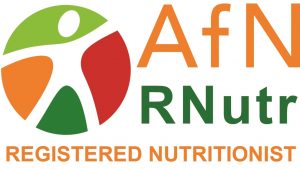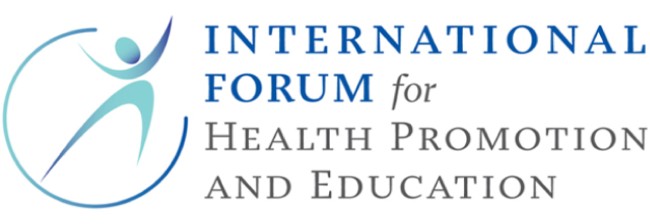There is no denying that snacks are an important part of most people’s diet as they can provide valuable nutrients as well as a feel good factor. Business executives travelling on work related assignments are often encouraged to snack, probably more often than usual, when they are in transit or sitting for a period of time especially during a flight. Overall, snacking contributes to our health and subsequent work performance in a variety of ways.
Some of the airlines, such as Easyjet, are now providing snacks on board which you can purchase during your short haul flight. Some of the snacks offered claim to be healthy options, pick-me-ups or even to make you ‘feel good’, implying a health benefit if you eat them. 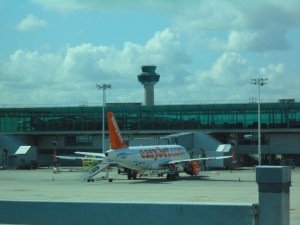
I recently flew Easyjet to discover just how ‘easy’ snacking healthily could be on a short haul flight without any additional fuss or acclaim.
When faced with a colourful brochure of items to choose from, it is important to explore the options carefully, if possible by checking out the nutritional information which might indicate more fully the suitability of the glowing description in the glossy in-flight service brochure. Although I must admit I didn’t find this easy as the brochure I was faced with didn’t display sufficient nutritional information as one has now come to expect from viewing the packaging first hand when making a purchase from a pre-flight airport shop.
Easyjet, as an example, has a Pick-me-ups section of snacks to choose from. They explain that ‘a healthy, varied and balanced diet is the best way to provide a traveller with the energy and nutrition needed for a journey’.
But just how much energy and nutrition does a traveller use when sitting for only a few hours or less? This is the first question which a business person should be asking themselves when an airline is using health to promote snack food items. Common sense should tell you that in reality not much energy is needed to sit. Indeed an average person sitting for one hour only expends approximately 70 to 100 calories for the average woman and man respectively. 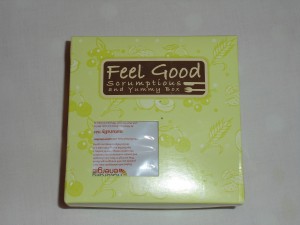
One option on the ‘Pick-me-ups’ is a Feel Good snack box. The contents contain a packet of The Dormen salted almonds, Oaty Bakes bitesize cheese snacks, Fudges spelt flatbread crackers, Mr M’s vegetable spread (pate), a bite size Green and Blacks organic chocolate bar, Nakd berry delight (raw fruit snack bar) and a packet of The Dormen cranberry and cherry dried fruits. All packaged in a delightful green box with ‘Feel Good, scrumptious and yummy box’ written on the front. Most items had ingredients along with nutritional information displayed on their individual packet (but not all) which were only accessible when the pack had been purchased and opened.
For a morning or afternoon snack, an average person (without any dietary restrictions) might reasonably aim for around 200 – 300 calories. This snack box provided at least circa 500 calories. So if you are thinking a light snack then you might be rather disappointed. The better option energy wise might be to share the contents with another passenger or opt for another item on the glossy menu.
Reviewing the menu again you might also notice that items in the Pick-me-ups section all appear to be rather ‘dry’. The deli delights (another snack selection) contains similar items to the Feel Good Snack box, then there is a couscous & lentil wholesome pot (only 268 calories) and a Heinz soup. The latter two options may need water added to reconstitute the ingredient mix, but I decided not to test this theory out.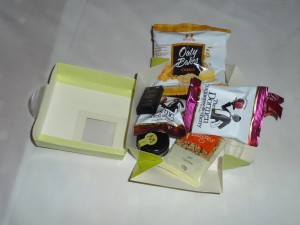
Not only does it sound ‘dry’ but it also sounds like the Pick-me-ups might be high in sodium. The Feel Good snack box I purchased had at least 1.3g total salt. When compared with a maximum of 6 g salt total in a day, this is quite high for a snack. A 25g packet of crisps is only around 0.5 g salt. If you consume high salt content for a snack, then you are likely to need to drink more to counteract the effects of the increased sodium content in your body. As a business traveller, you should also consider that when flying you will lose more water through your skin and lungs due to the dryness of the pressurisation of the cabins. So high sodium items, especially if you need to board a connecting flight, are not a great choice for a snack.
The final question should be “are these items healthier than choosing those from the fresh section?” The fresh section offers sandwiches (made on a daily basis), hot snacks such as toasted sandwiches, salads and muffins. Fortunately, there was nutritional information supplied on many of these, and given the choice, I ask wouldn’t a fresh sandwich or salad be preferable than a high sodium, high energy, dry snack?
So don’t be fooled into thinking that all ‘good for you’, ‘pick me ups’ or ‘wholesome pots of something’ might be the answer to healthy eating. It is probably better to stick with the likes of the well known fresh sandwich or salad. Better still opt for taking some items, such as fresh fruit, a wrap or salad with you on the plane.
Finally, I have to say it would be much easier if the nutritional information was supplied up front, so travellers could make an informed choice before purchasing, by placing such information in the glossy brochure. Then we can choose according to our needs with pre-purchase information, which is what good marketing and promotion of good health are all about.
© 2014 Extravitality




























